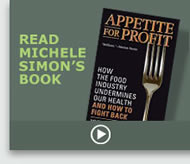Anti-Glossary
Understanding corporate-speak is a powerful tool for getting at the truth. Once you realize that corporations have very calculated ways of describing their practices, you can see right through the PR spin. Here are some examples.
Return to Table of Contents
|
Exclusive contracting/pouring rights |
| Activist judges | Any judge who has the potential to rule against a food company in a consumer lawsuit. As in: We have to pass laws to ban obesity-related lawsuits because we cannot trust activist judges to throw the case out. But in reality, most judges are quite conservative and do not often rule against corporate interests. |
| Advergaming | Web-based games commonly used to promote junk food to children. Web sites include Postopia.com and NabiscoWorld.com, both owned by Kraft. |
| Astroturf campaign | Refers to seemingly grassroots groups or coalitions that are actually fake, often created by corporations or public relations firms. |
| Balanced diet | The oversimplified and meaningless way that food companies like to describe how to eat. The purpose is to keep people confused about nutrition while maintaining the status quo.As in: All foods can fit into a balanced diet. |
| Better-for-you products | Processed-food companies’ way of describing self-defined nutritionally superior foods, using their worst product as comparison. For example, PepsiCo describes its Baked Lays chips as better for you than regular fried chips. |
| Brand loyalty | The tendency of consumers to continue buying a specific brand’s product or service despite the competition. Food companies fiercely compete for brand loyalty, which results in ubiquitous marketing. |
| Branding | The process whereby brand image is developed to make consumers think there is something special about one cola, hamburger, etc., over another. |
| Buzz or viral marketing | Tactics designed to get people to talk about (create a buzz) or pass along messages about a brand or product. It’s especially popular for corporations to aim this technique at teenagers. |
| Callouts (aka flags) | Marketing technique on food packaging to indicate some dubious health benefit. For example, trans fat free or Sensible Solution. |
| Character merchandising | Employing the use of popular fictional characters to market products to children. Most ubiquitous example: SpongeBob SquarePants. |
| Cheeseburger bills | The nickname given (by either the media or industry) to bills being passed by a number of states that would bar consumers from suing food companies, the scope of which remain unclear. Inspired by a lawsuit filed against McDonald’s. |
| Choice (aka options) | How food lobbyists like to justify maintaining the status quo and deflect government regulation. As in: We are providing Americans with a wide array of food choices. But we should ask who gets to decide what those choices are. |
| Cobranding | When two companies form a new product together, such as Reese’s Puffs cereal (Hershey and General Mills). |
| Commitment | The tired word used by food companies and trade associations to position themselves as part of the solution. As in: We are making a number of commitments to do our part in solving the problem of obesity. |
| Communicate | Corporate marketing euphemism for advertising. As in: We rely on a number of ways to communicate the benefits of our products to consumers. |
| Complex issue | How industry selectively describes obesity. For example, in talking about regulating junk food sales in schools, companies argue that it won’t work because obesity is such a complex issue. Curiously , though, the problem becomes less complex when the proposed solution is personal responsibility or exercise. |
| Convenience | The way that industry describes most highly processed, packaged foods, to give the impression that they are helpful to the consumer. But we should ask: convenient for whom? |
| Corporate responsibility | Another way that Big Food proclaims itself as part of the solution. As in: Corporate responsibility is part of our DNA (McDonald’s). Also, many companies have annual corporate-responsibility reports that now include alleged commitments to reducing obesity. |
| Cross-promotion | A sales promotion technique whereby the advertisement or promotion for one product includes a promotional message for another product; for example, Star Wars toys at Burger King. |
| Energy balance | The oversimplified term that food executives use to explain obesity in a way that sounds objective and scientific, but which conveniently obscures over consumption of their unhealthy products. It also has the added benefit of emphasizing weight loss and physical activity, keeping the focus on individual behavioral change. |
| Exclusive contracting/pouring rights |
When soda companies (mainly Coca-Cola and PepsiCo) form contracts with schools to have the right to sell only that company’s products on school grounds. Often these deals last for many years, and can contain lucrative signing bonuses and incentives that result in promoting unhealthy beverages. |
| Food nazi aka food police |
How some lobbyists like to refer to nutrition advocates who dare to call on the government to enact reasonable regulations. |
| Free speech | Guaranteed by the First Amendment and invoked by food lobbyists to justify the status quo related to out-of-control marketing of junk food, especially to kids. But there is no absolute right to free speech, especially for corporations. |
| Freedom | What some food lobbyists invoke (along with choice) to play on American values and strike fear into the hearts of Americans. As in: The food police are trying to take away your freedom to enjoy Big Macs and milkshakes. |
| Frivolous lawsuits | The right wing’s favorite moniker for any lawsuit filed by a consumer against a corporate interest. Food lobbyists have adopted it to describe the imaginary onslaught of obesity-related lawsuits against food companies. |
| Fun-for-you products | Foods with no nutritional benefit, as described by companies like PepsiCo seeking to distinguish its other better-for-you products. Of course, it wouldn’t be so great for sales to call them bad-for-you. |
| Functional benefit | How food marketers like to describe certain unhealthy products, such as sports drinks, claiming they provide energy or hydration. |
| Good or bad foods | As in: There are no good or bad foods; all foods can fit into a balanced diet. This is how food companies (and many nutritionists who perpetuate this myth) keep people confused and deflect any criticism about unhealthy products. |
| Good-for-you products | How PepsiCo defines that subsection of its Smart Spot products that they say are actively good for you, such as Tropicana orange juice or Quaker oatmeal. This is to distinguish from (and place on a higher plane than) the better-for-you products such as Diet Pepsi and Baked Lays. (See better-for-you.) |
| Government relations/affairs | Industry’s euphemism for lobbying. A corporate executive with a title such as vice president, government relations is probably a lobbyist. |
| Halo effect | Forming an overall positive impression because of one good characteristic. For example, McDonald’s seeks to earn a halo effect for promoting salads since a belief that the company is now selling healthier food might draw consumers in. |
| Healthy lifestyles | Another way of distracting attention away from talking about food. As in: We believe, as do many nutrition experts, that solving the obesity problem is about maintaining a healthy lifestyle and achieving the proper energy balance (Grocery Manufacturers Association). |
| Heavy users | Loosely defined as the 20 percent of fast-food eaters who account for 60 percent of all fast-food sales. A typical heavy user is male, in his twenties or thirties and extremely loyal to burgers and fries–where fast-food companies make most of their money. |
| Host selling | Where a character appearing in a television show also appears in a commercial during that show. This is illegal for children’s television, but there are numerous workarounds. |
| Hydration | Makers of sports drinks such as Gatorade claim their products offer hydration benefits and that such products hydrate better than water. But most sports drinks are full of sugar and much of the research is conducted on marathon athletes. |
| In-store promotions | A catchall term for the wide variety of sales promotions and advertisement efforts that occur at the point of purchase. For example, kids are lured into fast-food outlets with toy promotions. |
| Initiative | Self-aggrandizing term food companies like to use to describe any excuse for a press release. The idea is to position themselves as part of the solution by announcing some great new initiative such as a biased educational program for schools. |
| Interactive product placement |
Planned marketing technology to enable viewers to instantly purchase products used by characters they see in movies and TV programs. |
| Junk science | The generalized term the right wing uses to describe any science that goes against corporate interests. For example, bona fide research that soda is linked to obesity is often dismissed by soda-industry lobbyists as junk science. |
| Licensing | When owners of certain copyrights sell their rights to other companies. For example, when Disney sells a license to McDonald’s to market movie-related toys. |
| Local control | The excuse used by multinational companies such as Coca-Cola for why it opposes state legislation to get soda out of schools. If you hear the argument for local control, ask who is making the argument and what interests they represent. |
| Moderation | How food companies (and many nutritionists) recommend we eat. As in, Eat all foods in moderation. It’s a meaningless word that leaves people in the dark. |
| Moms | The condescending and sexist way that food companies like to refer to mothers when talking about marketing to children. As in: We want to help moms make good choices (paraphrasing PepsiCo). McDonald’s even has a Global Moms Panel. |
| Nag factor | How marketers refer to the influence that children have on their parents; i.e., to get kids to nag their parents to buy them the junk food they see advertised. |
| Opportunity | What food companies like to call obesity. As in: Wethink this is a great opportunity, meaning they can make money promoting allegedly healthier food. |
| Parental responsibility | Term food lobbyists use to deflect blame for excessive marketing to children by blaming it all on the parents. |
| Part of the solution | Food companies claim they are part of the solution to obesity, for example, by marketing healthier products and promoting health education in schools. |
| Personal responsibility | The concept food lobbyists like to use to deflect blame in general, by blaming individuals for their fate–never mind the billions of dollars they spend in marketing each year. |
| Point of purchase | How marketers refer to the placement of certain messages targeting consumers at the moment they make a decision about buying a product to encourage what industry calls impulse purchases. For example, product packaging blazoned with cartoon characters and placed at a child’s eye level at the point of purchase is a critical marketing tool to get young consumers to nag their parents. |
| Portfolio | How the large food companies refer to their array of brands. As in, We have a wide portfolio of products that consumers can choose from to meet their needs. |
| Portion control | Almost every processed-food company now makes 100-calorie portion control products, from cookies to popcorn to soda. It’s a great way to make you pay more for less while destroying the environment with excessive packaging. |
| Positives | How some companies like to refer to artificially adding nutrients, such as vitamins, to otherwise unhealthy products. As in, Our focus has been on reducing fat, reducing sugar, and adding positives (PepsiCo). |
| Presweetened | Euphemism for any food that contains a lot of sugar. Mostly used by General Mills to describe its children’s cereals to deflect critics. As in: Even presweetened cereals are the best breakfast your child could eat. |
| Product placement | When a product appears in a TV program or movie, paid for by the manufacturer to gain exposure. |
| Public-private partnership |
An increasingly common arrangement whereby a government agency or nonprofit organization partners with a food corporation, usually for some health-related promotional activity that focuses on individual behavior change. |
| Reformulation | One of the strategies processed-food companies are using to trick us into thinking they are making healthier products. For example, General Mills has reformulated all of its cereals to contain whole grain–even sugary kids’ brands. |
| Self-regulation | The voluntary system of oversight that food corporations prefer to having government meddling in their business practices. |
| Sensible Solutions | Kraft Foods’ self-defined nutritional seal program. Sensible Solutions products marketed to kids include 1/2 the Sugar Fruity Pebbles and Pepperoni Flavored Sausage Pizza Lunchables. |
| Silver bullet | Term food lobbyists like to use to dismiss any regulation that singles out their products. As in: Getting junk food out of schools is no silver bullet solution to obesity. |
| Smart Spot | PepsiCo’s self-defined nutritional seal program. Smart Spot products include Diet Pepsi, Gatorade, and Baked Lays. |
| Sound science | The objective-sounding way that food companies like to justify their opposition to any policy that would interfere with their bottom line. As in: We cannot act to remove soda and junk food from schools in the absence of ‘sound science.’ But for industry, no amount of science will ever be sufficient. |
| Stealth marketing | A technique whereby consumers are not aware that they are being marketed to. Children are especially vulnerable, for example, to product placement. |
| Suggestive selling | When the clerk or waiter suggests additional food items; restaurants train personnel in this tactic. As in: Do you want fries with that? |
| Third-party experts | When food lobbyists want to hide the biased nature of their scientific conclusions, they often hire third-party experts who have no obvious connection to industry. These experts may testify against nutrition legislation, publish scientific articles, or otherwise represent corporate views without revealing their backing. |
| Tort reform | What the right wing calls legislation to restrict consumers’ access to the courtroom. Laws being passed to ban obesity lawsuits are one example. |
| Trial lawyers (as in greedy) |
The scapegoat for the nation’s economic problems. In the food context, greedy trial lawyers are allegedly targeting food makers with frivolous lawsuits despite only one obesity-related case having been filed so far. |















